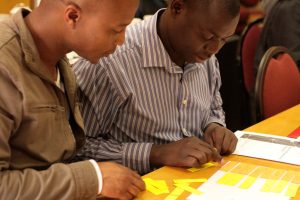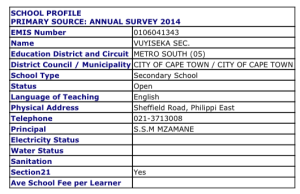Background
Vuyiseka Secondary School is located in the Philippi East area of Cape Town. Statistics about the school were taken from the Western Cape Education Department website; click on the image below.
According to the 2014 statistics, all learners in the school (approximately 770) have isiXhosa as their home language, and they are taught in English. In Grade 10, over 75% of the 173 learners take took mathematical literacy. In Grade 11 the total number of learners on roll reduced to 127 with 79 taking mathematical literacy (62%). In Grade 12, the numbers on roll were further reduced to 119, and of these remaining learners, over 90% took mathematical literacy.
Two teachers from the school are taking part in the FaSMEd research: Zukile Sisilana and Severino Sedeya. The photograph of them, below, was taken at the meeting held at AIMS in Muizenberg on 30th October 2014.

What’s happened so far ….
Ingrid was not able to come to the meeting so Virgenia accompanied Marie. We arrived at the school campus just before 10:00. We were shown into an area in which we could wait. Zuki and Severino came to meet us and we were introduced to Mr Mbulani. He took us to his office and chairs were brought in for everyone to sit on.
Marie began by giving general information about the project, much of which is summarised in the sheet of information she gave the teachers. Marie ended by speaking about ethical considerations and what is expected of teachers choosing to be involved in the project.
When we were finished, Mr Mbulani suggested that the two teachers think about what level of ethical consent they are happy with and went off to find the principal to ask him to sign the form for the school. He returned with the deputy principal, Mrs Sibula, and then left. The two teachers also left. Marie explained about the project and Mrs Sibula went to ask the principal to sign the form. She returned with the form and signed it and added an official stamp.
We observed both teachers teaching an ordinary lesson on 3rd March. Severino’s lesson to about 50 learners in Grade 10 was on the topic of exponents.
Zukile’s lesson to 45 learners, in a Grade 10 mathematics literacy class, was on word problems.
We took observation notes and produced separate reports on each lesson. The teachers were given the reports and invited to comment, but it seems they were happy with the reports.
First research lesson
Severino chose to teach the exponents lesson for the research lesson, on 17th March. Zukile taught the lesson on real-life equations on the same day.
For both lessons, we produced research reports which we have shared with the teachers.
Second research lesson
Severino taught a lesson in which students were required to match sets of function (and non-function) cards: equations, graphs, tables of values and descriptions in words.
Zukile’s class had been working on scale and drawing plans, so we suggested he might like to do the garden design task. Danny worked through it with him at the planning meeting and together they decided that it should be simplified.
The lessons both took place on 28th May and as before we wrote research reports and gave them to the teachers for comment.
Third research lesson
Ingrid met Zukile and Severino and asked what lesson they would like to do in the third term. Zuki showed her the year plan for mathematics literacy and she suggested that a lesson on percentage increase and decrease would fit well. We found a MAP lesson on this and showed it to Zuki; he said he thought it would work well.
Severino said that his class was doing financial maths, and we found a card-matching activity designed to embed investment concepts and emphasise the differences between simple and compound interest. Severino asked us to make a few changes (mostly to the ways in which the formulas were written)
Both Zuki and Severino taught their lessons on 25th August and we wrote research reports which we shared with them.
Finishing off
Severino told us that his learners expected some sort of ‘feedback’ from us after the lessons and we suggested that we could prepare a video montage of this three lesson to show the learners. He said this was a good idea and when we asked Zuki, he agreed that his class would also like something like this. We made the two videos and then took them to school to show the learners on 4th September. We also gave each of the learners a pack of NikNaks.
